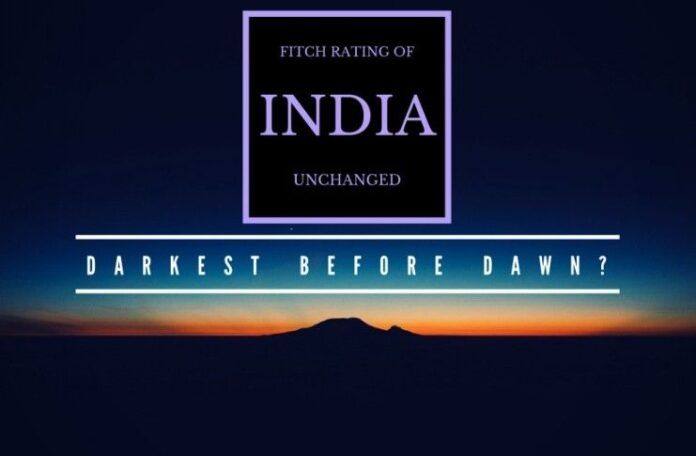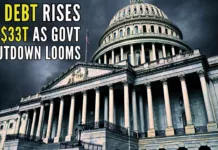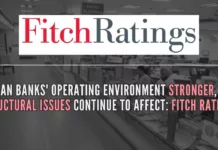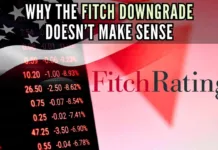
Fitch’s ratings of India unchanged
[dropcap color=”#008040″ boxed=”yes” boxed_radius=”8px” class=”” id=””]T[/dropcap]he rating agency Fitch’s refusal to upgrade India’s sovereign rating underlines the Narendra Modi government’s inability to galvanize the economy. So, the rating remains unchanged at BBB-, the lowest investment grade with stable outlook.
It is a sad commentary on the management of public finance that despite the halving of petroleum crude prices, and hardly any corresponding decline in retail fuel prices, the government has not been able to rein in the fiscal deficit.
What keeps our ratings down are the usual culprits — fiscal profligacy and restrictive business environment. “Weak public finances continue to constrain India’s ratings, with a high general government debt burden of 67.9 per cent of GDP (BBB median: 40.9 per cent) and wide fiscal balance of -6.6 per cent of GDP (BBB median: -2.7 per cent), as estimated by Fitch for FY17. However, there are some early indications that fiscal policy might become more focused on bringing down debt,” the US-based agency said in its report.
It is a sad commentary on the management of public finance that despite the halving of petroleum crude prices, and hardly any corresponding decline in retail fuel prices, the government has not been able to rein in the fiscal deficit.
[dropcap color=”#008040″ boxed=”yes” boxed_radius=”8px” class=”” id=””]T[/dropcap]he agency talks about the “difficult business environment,” though it “is likely to gradually improve with the implementation and continued broadening of the government’s structural reform agenda.” This exposes the hollowness and uselessness of the high-profile campaigns like Make in India. Glitzy jamborees neither improve the business environment nor help enhance the ease of doing business; World Bank reports have already shown the latter.
…Modi has found nirvana in efficient populism, for it has delivered a dream electoral verdict in the country’s largest state, UP.
At the heart of the government’s failure in managing the economy is its inability or unwillingness to implement and broaden the structural reform agenda. In fact, not much seems to be happening on the reform front. As I mentioned earlier, Modi has found nirvana in efficient populism, for it has delivered a dream electoral verdict in the country’s largest state, UP. Nirvana, because remaining in power is the summum bonum of a politician’s existence, unlike that of a statesman who wants things to change for the better. And Modi is a quintessential politician, evidently uninfected by the virus of statesmanship.
So, we see no meaningful reform. Forget about the privatization of public sector undertakings, even public sector banks (PSBs) are kept firmly under government control. Fitch goes on to list the problems of PSBs: “Significant contingent liabilities for the sovereign continue to emanate from public sector banks.” The problem of high non-performing assets or NPAs is “well recognized by authorities, but continues to linger.”
[dropcap color=”#008040″ boxed=”yes” boxed_radius=”8px” class=”” id=””]T[/dropcap]his doubly hurts: first, it burdens the exchequer; and, second, since NPAs are mostly a problem with PSBs, which account for about three-fourths of the banking sector, these banks don’t have much to lend, leading to a credit crunch.
Indian policy-makers never listened to the criticism of socialism that they practiced till 1991; and now the Modi regime is unwilling to pay heed to any adverse remark about its economic policies.
All these are well-known facts; the solutions too are well-known. Recently, Reserve Bank of India (RBI) Deputy Governor Viral Acharya favored the re-privatization of some nationalized banks: “This will reduce the overall amount that the government needs to inject as bank capital and help preserve its hard-earned fiscal discipline, along with stable inflation outlook and the diverse nature of our growth engine.” The government has not done anything in this regard—and, given the statist mindset of those who matter, is unlikely to.
To Fitch’s recent report, the government hasn’t responded so far. It seems convinced that rating agencies are prejudiced against our country. It actually accused them of anti-India bias in Economic Survey 2016-17. “In recent years, the role of ratings agencies has increasingly come into question,” the Survey said. It went on to question the soundness of the agencies’ methodologies.
This is typical ostrich-like mentality. Indian policy-makers never listened to the criticism of socialism that they practiced till 1991; and now the Modi regime is unwilling to pay heed to any adverse remark about its economic policies. The more the things change, the more they remain the same.
- Liberty Is Penalized, Violence Goes Untouched - December 21, 2019
- Rahul’s Howdy bloomer - September 22, 2019
- Chidambaram’s hypocrisy - August 22, 2019











1. We still don’t know who are the big NPA holders although in every budget our money is given free to PSU Banks.
2. The merger of Indian Airlines and Air India and other means to bleed national carriers was a major scam. 3 years on and we have not seen any movement in punishing the culprits.
3. No movement on forex derivative scam.
4. No report on success or failure of demonetization.
5. No significant effort for improvement to Judicial system in country. Budget allocation for judiciary looks like piggy bank account.
6. Govt was supposed to crackdown on Benami properties after demonetisation. Don’t know what they are waiting for.
7. Ever increasing govt spending on things that people don’t want.
8. So many political murders are happening in Kerala and Bengal. I have not heard PM even mention those.
9. No movement on bringing back black money abroad.
This article assumes that Fitch knows what Indian Government should do to solve its problems, more than our own Governments.
In the book, “Small Is Beautiful”, Schumacher says developed economies and bodies like IMF and WB act as though, in Economics people don’t matter; only economic indicators do, and they should be at the centre of economics and people should be driven to accomplish these indices.
We should understand that economics exists for the sake of people and not the other way around. It is ostrich-like to let the poor die and go ahead and try to build the economy on their skeletons. A proper balance between survival of the poor and development should be struck, always.
But this is not to dispute that there are some failures of the Government too; e.g., NPAs. NDA inherited from UPA, most of the NPA problems, but it is 3 years and it should have found some solution by now, or should indicate the road map the Government has in mind, to give confidence to the nation.
But the situation is not as bad as is being portrayed by Fitch and other foreign bodies. It is the very same foreign rating agencies and bodies like the IMF and WB whose prescriptions have failed many nations in the past. They are not manna from the heavens.
Do not try to cast aspersions on the rating agencies though you did not directly do so but your round about talk indicates so. This is the malaise of all so-called right wing nationalist economic thinkers..
Just look at the numbers esp deficit figures put out by these agencies (btw will any Govt of the day esp will its ruling party allow them to talk about boldly these numbers in public..?) and criticize the figures if incorrect etc. One doesn’t have to accept the ways they recommend to mitigate/solve the problems indicated though.
As far as i know even these deficit figures are understated as lot of states deficit numbers have jumped in last few years though centre’s fiscal discipline seem to be improving marginally thanks to crude prices coolin.
My estimate says GOI is sitting on somewhere between 3.1-4% of fiscal deficit togther with Revenue deficit of 2.1%(this must have come down to higher revenue esp in indirect tax,defaulters penalty etc post demonetisation). Also CAD (external vulnerability in forex) is estimated to be around 2% which will vary if imports are curbed to promote domestic supply like steel etc. Overall still it is glaringly obvious as indicated by Fitch the debt situation is critical only but with high/good hope of cooling down due to tax mop up,GST etc.